 |
A note on how the works are referenced on this site.
Downloadable Files (Project Gutenberg)
The Jewish War (460 KB)
Antiquities of the Jews (1,030 KB)
The Life (60 KB)
Against Apion (90 KB)
The Works of Josephus
The Whiston translation online (external link).
The Works of Josephus in Greek
The Greek text of B. Niese at the Perseus Project.
Brill Translations with Commentary
The essential internet site for Josephus scholars is PACE, the Project on Ancient Cultural Engagement, led by Professor Steve Mason. Incredibly, the Brill translation and commentary, which is very expensive in hardcover, is available FREE on the PACE site. The English translation appears parallel to the Greek text of Niese (provided by The Perseus Project) and commentary is seen by clicking on the footnote numbers. Clicking on a Greek word brings up the Perseus analysis tools. The published volumes of the Brill Josephus Project are now:
- Life (Mason)
- Ant. 1-4 (Feldman)
- Ant. 5-7 (Begg)
- Ant. 8-10 (Begg, Spilsbury)
- Ant. 11 (Spilsbury, Seeman)
- Ant. 15 (van Henten)
- Against Apion (Barclay)
- War Book 2 (Mason)
- War Book 4 (Mason)
See the previously posted reviews of the volumes of the Brill Commentary Life and Antiquities 1-4.
Biography
Timeline
Josephus' life in the context of events in Rome and early Christianity.
Genealogy
Descent from the Hasmoneans (Maccabees).
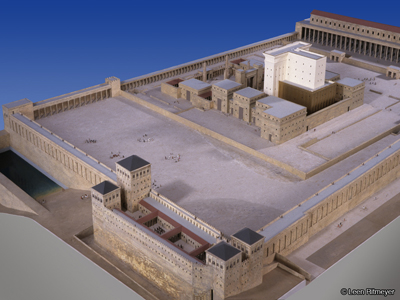
Image by Ritmeyer Archaeological Design.
Josephus on the Destruction of the Temple
Josephus on the Causes of the War Against Rome
Josephus as a Source for a Military History of the Jewish Revolt
by Jim Bloom
Crane Brinton's Model of Revolution and the Jewish Revolt
by Ken West
Lion Feuchtwanger and his Josephus Trilogy
by Jim Bloom
Introduction
Part 1: Revolt in Jerusalem
August-September 66 CE
Part 2: The Campaign of Cestius Gallus and the Defeat of the XIIth Legion
October-November 66 CE
Part 3: The New Government
November 66 - March 67
Part 4: Josephus in Galilee
December 66 - May 67
Part 5: The Success of Vespasian
January 67 - December 69
Part 6: The Factions Battle for Power
January 68 - May 70
Part 7: The Siege and Destruction of Jerusalem
March 70 - September 70
Passover
The collection of all occurrences of Passover stories in Josephus' writing; with commentary.
Pentecost / Shavuos
Everything Josephus has to say about the celebration of the festival of Pentecost (Shavuos) -- including the most violent protest prior to the War.
Sukkot
The Feast of Tabernacles, with its great crowds in Jerusalem, often marked the beginning and end of dynasties. Here is a summary of these events in the works of Josephus
Rosh Hashanah and Yom Kippur
The holiest days of modern Judaism are barely mentioned by Josephus. Why?
Purim
Esther's story.
Hanukkah
Did Josephus censor his description of Hanukkah?
Women in Josephus' Works
An overview.
Queen Alexandra
The female ruler of Judea.
Mariamme
The story of the the last Hasmonean princess, whom Herod married to secure his kingdom, and their stormy marriage.
Esther - Her Point of View
Josephus' retelling of the story of Esther.
"Trouble-quiet Sowers of Unrest": Representations of Women, from Josephus to Cary
by Maria M. Oberg. Elizabeth Cary, the 17th century English playwright, drew from Josephus to compose her work The Tragedy of Mariam, the Fair Queen of Jewry.The manner in which these two authors portray the actions of speech of women is the subject of this engrossing study
The Hasmonean Dynasty
Genealogical chart of the Jewish rulers of Judaea, drawn from Josephus' account.
Ancient Jewish Coins Related to the Works of Josephus
The history of the rulers of Judaea as revealed in ancient silver and bronze coins.
Gaza
The relations between Judeans and the people on the coast have often been difficult, as Josephus relates.
The Campaign against Al Qaeda and the Jewish War: Some Parallels
by Jim Bloom (December 2001)
Remarks on Josephus in the Light of Current Events: 2001
by G. J. Goldberg (December 2001)
Links
Steve Mason at York University
Josephus Works at PACE: Brill, Whiston and Greek
Josephus Bibliography On-Line at PACE
Perseus Greek Texts and Translations
Resource Pages for Biblical Studies
New Testament Gateway
Ritmeyer Archaeological Design
Josephus in General
Articles
Archaeology and Josephus
Judaism and Early Christianity
Language
Literary Works Connected to Josephus
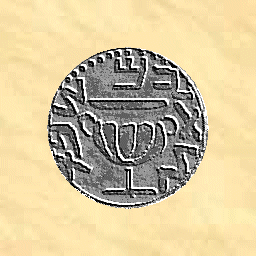
|
The earliest description of Jesus outside of the Gospels is found in Josephus' Jewish Antiquities. Yet for centuries scholars have doubted that a Jewish writer could have written an account that contains basic tenets of Christian belief. This conflict is resolved by understanding the source of Josephus' composition.
In the following article published in 2022, Josephus's methods for paraphrasing his sources are examined in depth.
Josephus's Paraphrase Style and the Testimonium Flavianum
by Gary J. Goldberg
published in
Journal for the Study of the Historical Jesus: Volume 20, Issue 1 (Feb 2022)
This article is Open Access and available here for download: Josephus's Paraphrase Style and the Testimonium Flavianum(PDF). An online version can be read here.
Abstract
The controversial account of Jesus found in Josephus's Jewish Antiquities 18.63-64, known as the Testimonium Flavianum, has puzzling similarities to Luke 24.18-24, a portion of the Emmaus narrative. This article proposes an explanation based on established research into Josephus's methods of composition.
Through a phrase-by-phrase study, this article finds that the Testimonium can be derived from the Emmaus narrative using transformations Josephus is demonstrated to have employed in paraphrasing known sources for the Antiquities. Precedents are identified in word adoption/ substitution and content modification. Consequently, I submit that the Testimonium
is Josephus' paraphrase of a Christian source. This result also resolves the difficulties that have raised doubts about the Testimonium's authenticity, with implications for the understanding of the historical Jesus.
The following articles summarize and expand on this research.
1. New Solution to the Josephus-Jesus Mystery Brings Fresh Evidence To a Problem Long Thought Unsolvable
In this post, I give an introduction to the paraphrase article and its implications.
2. Evaluating the Josephus-Jesus Paraphrase Model
I expand on the article by providing a convenient color-coded summary that displays the paraphrase evidence at a glance. I also elaborate on the difference between this model and earlier proposals and discuss some of the implications for the dating of the gospels and the nature of early relations between Christians and Jews.
The Basis for the New Approach to the Testimonium
Note: The following articles elaborate on the 1995 article. They have yet to be upgraded to include the evidence and arguments of the 2022 article.
Introduction.
Josephus' Account of Jesus.
1. The Mystery of Josephus' Jesus Account
A summary of the history of the controversy.
2. The Josephus-Luke Connection
3. The Testimonium-Luke Comparison Table
At-a-glance view of the parallels between the two Jesus descriptions.
4. Statistical Analysis of Jesus Texts
The statistical significance of the Testimonium-Luke relationship when compared with other Jesus descriptions from early Christianity.
5. Quantitative Content Analysis of Jesus Texts
Further statistical studies.
6. Critique of John Meier's Argument in A Marginal Jew in Light of the Lukan Connection
7. Conclusions: Answers to Frequently Asked Testimonium Questions
How the past puzzles of the Jesus account of Josephus are resolved by the Lukan source.
8. Testimonium Bibliography
Appendix: Robert Eisler on the Testimonium Flavianum
New Testament Parallels
Side-by-side comparison of Josephus and the New Testament.
Jesus of Nazareth
All of the references by Josephus to Jesus, James, and Pontius Pilate
John the Baptist
A discussion of Josephus' account of John the Baptist and its relation to New Testament passages.
The Star of Bethlehem
Speculation on a prophetic image.
Honi the Circle-Drawer
A popular miracle-worker is killed in Jerusalem at Passover.
How is the name "Josephus" pronounced?
Where does Josephus tell the story of Masada?
Does Josephus describe Jesus' physical appearance?
What are the oldest manuscripts we have of Josephus' works?
Did Josephus write the "Discourse on Hades?"
Could Luke and Josephus both be right about Lysanias, Tetrach of Abilene?
What are your credentials?
Josephus in America
Josephus on Audio
Archaeological Correction: Gamla and Cana
The Veil of the Temple
A Rope on the High Priest?
Michal's Idol
Translating the Sodomites
Editions of Josephus
Complete Works
Condensed Versions
Josephus Studies
Bibliographies and Scholarly Aids
Josephus in Literary Fiction
MONTY PYTHON AND THE WORKS OF JOSEPHUS
"What Jesus blatantly fails to appreciate is that it's the meek who are the problem."
First-Century Judaea
Links to Book Reviews - Society of Biblical Literature
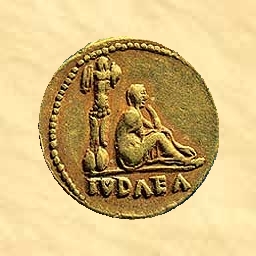
|
 |
What's New
Note: To make use of newer technology, latest articles are currently being posted at
JosephusBlog.org.
Latest post
The origin of Josephus's passage about Jesus is best explained by the paraphrase model detailed in "Josephus's Paraphrase Style and the Testimonium Flavianum". In this post, I expand on the article with a convenient color-coded summary that displays the paraphrase evidence at a glance. I also elaborate on the difference between this model and earlier proposals and discuss some of the implications for the dating of the gospels and the nature of early relations between Christians and Jews.
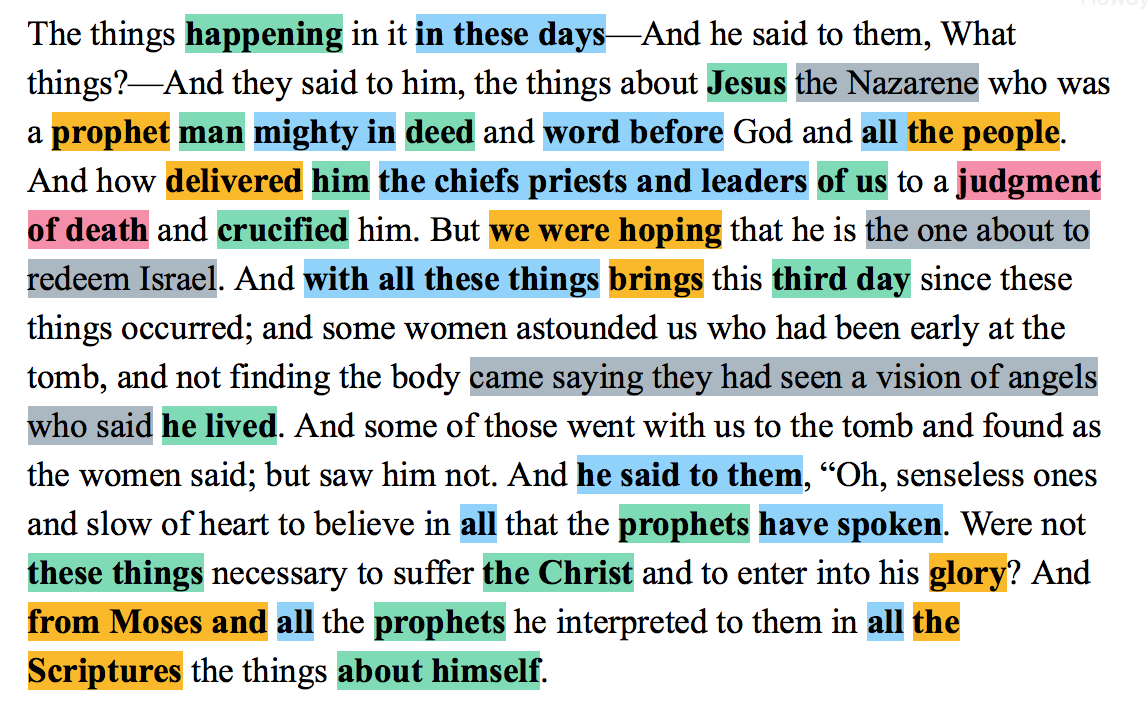
Read the post
Recently Added
|
In an article published in the February 2022 issue of the Journal for the Study of the Historical Jesus, I present extensive evidence for a new model that provides a simple and natural explanation of the composition of the Jesus passage.
|
|
This explanation makes use of the copious research investigators of Josephus have made on his methods of composition used throughout his Jewish Antiquities. In this blog post I give a summary of the article and its implications.
Read the post
|
The journal article is:
by Gary J. Goldberg
Published in the
Journal for the Study of the Historical Jesus: Volume 20, Issue 1 (Feb 2022)
This article is published on the Brill JSHJ site as Open Access and is available here for download: Josephus's Paraphrase Style and the Testimonium Flavianum(PDF).
King David's Pandemic
January 29, 2022
The Bible tells the story of a nation-wide pandemic under King David, circa 1000 BCE. The terrible plague was attributed to a mysterious sin by the king and ended with an act of redemption of great consequence to Jewish history: the establishment of the site of the Jerusalem Temple. When Josephus retold this story for a skeptical Roman audience in the first century CE, he struggled with having to explain the actions of a just Deity who unleashes a deadly disease upon an innocent populace. In this article I will examine how Josephus changed the story to emphasize the human suffering and heroism during the plague. And I will try to relate the story to the current global pandemic, which began circa November 2019 CE.
Read the post
Here is a recent article by Steve Mason, "Why Josephus Matters", in The Marginalia Review:
https://themarginaliareview.com/why-josephus-matters/
The Christmas Journey and the Jewish Revolt
December 24, 2021
|
|
The journey to Bethlehem in Luke's story of the first Christmas is motivated by the Roman census. Jewish readers of Luke in the first century would remember the census as connected to the Jewish Revolt of the year 66. How would they have reacted to Luke's use of this event?
|
|
|
|
Dec 2, 2021
The recent conclusion that an asteroid or comet caused the destruction of urban centers in the Jordan Valley over 3600 years ago leads to serious consideration as to whether the cataclysm was the source of the biblical story of the destruction of Sodom.
The plausibility of this identification depends on whether the time and place of the biblical story can be reconciled.
On this, Josephus provides some critical information. He also wrestles with the plausibility and meaning of the mass destruction for his skeptical non-Jewish readers. And why was this event intertwined with the story of Abraham?
Updated Link
Steve Mason's PACE website has a new home as of June 2021.
The Flavius Josephus Home Page address is www.Josephus.org.
Please send comments to: gary@josephus.org
Last update: July 8, 2012
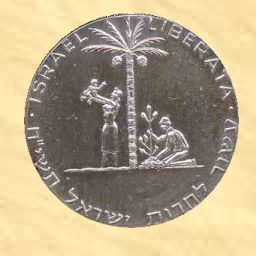
|
 |
|





